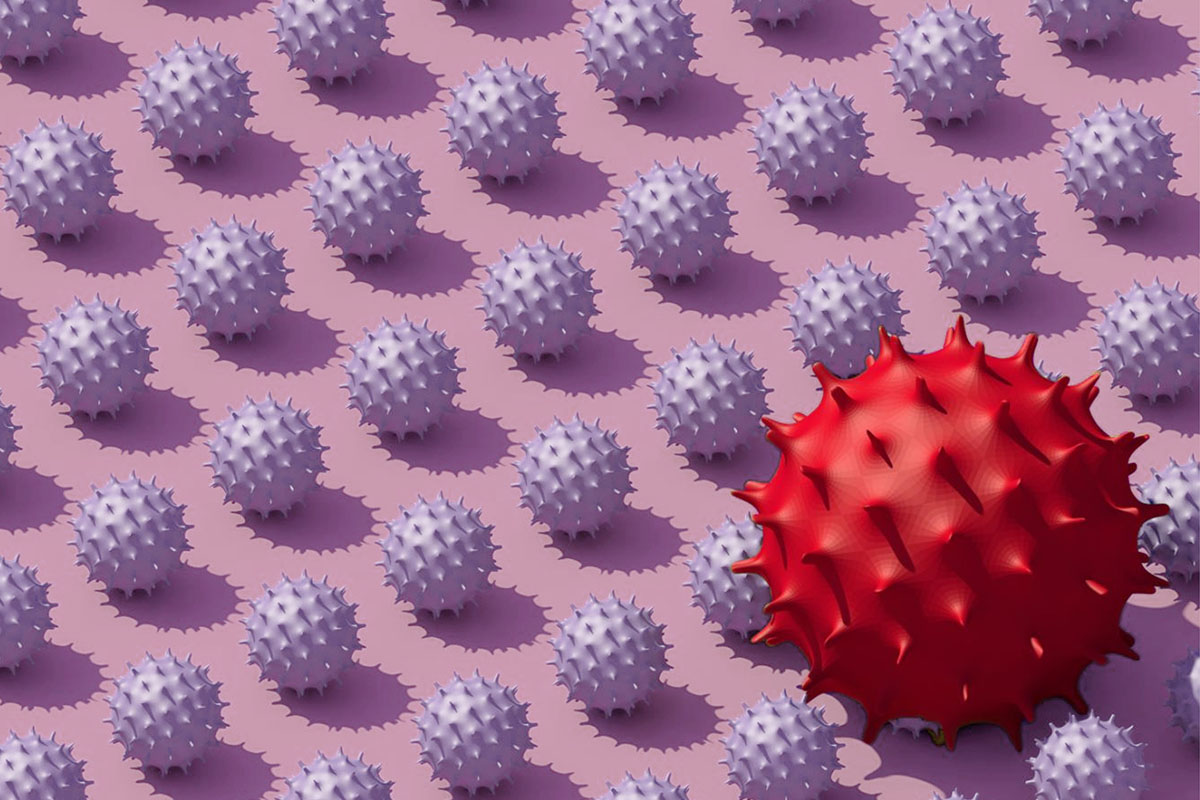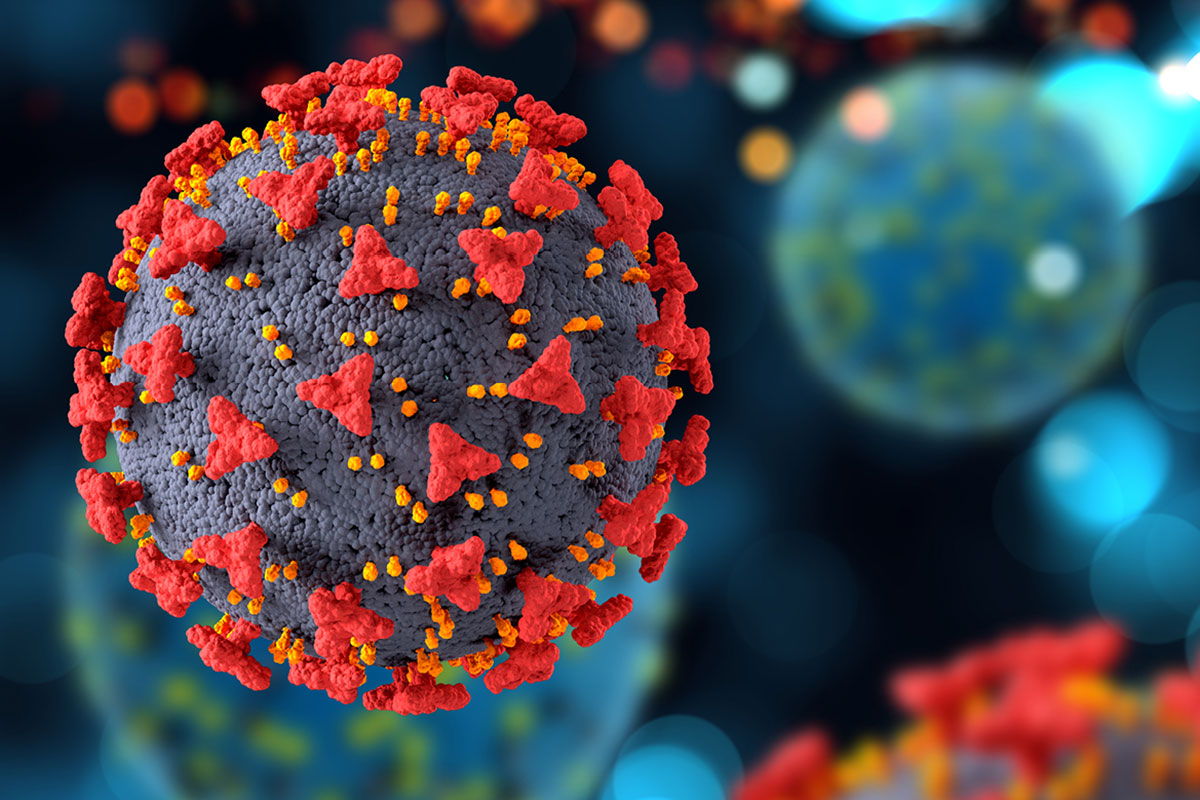
Issue 40 / November 2021
COVID-19 Special
SARS-CoV-2 Variants: A Cause for Concern?

The COVID-19 pandemic has been nothing if unpredictable. Just as it looked like Singapore had the situation under control, with cases falling and more people getting vaccinated, new SARS-CoV-2 variants started to emerge.
ome of these variants, such as the Delta, appear to be more contagious than the “original” virus. To understand the potential impact of these variants, we need to consider what a virus variant is and what their implications are for the course of the pandemic and public health.
Viruses rapidly and constantly change through mutations or changes in the virus DNA. A SARS-CoV-2 variant is a form of the virus that contains one or more mutations that differentiate it from the original SARS-CoV-2. Similar to other pandemics, several SARS-CoV-2 variants have emerged throughout the world.
Several scientific groups are tracking and reporting on the variants. These include the Global Initiative on Sharing Avian Influenza Data (GISAID) and the SARS-CoV-2 Interagency Group (SIG), which is made up of Centers for Disease Control and Prevention (CDC), National Institutes of Health (NIH), United States Food and Drug Administration (FDA) and other agencies. They classify variants into three groups:
|
1. |
Variant of interest (VOI), |
|
2. |
Variant of concern (VOC), and |
|
3. |
Variant of high consequence (VOHC). |
Variants of interest (VOI)
A VOI has specific genetic mutations that can change how the virus binds to its receptor on human cells. This may in turn make the variant less susceptible to neutralisation by antibodies that are generated from vaccination or COVID-19 infection. A second criteria for a VOI is evidence that the variant caused an increased proportion of cases or unique outbreak clusters, but with a limited prevalence globally. Therefore, a VOI must be monitored to determine how easily the virus is transmitted from person to person, the severity of disease, the effectiveness of therapeutics and the ability of currently authorised vaccines to protect against the VOI.
In the UK study, the Pfizer-BioNTech vaccine’s effectiveness fell to 90%, 85% and 78% at 30, 60 and 90 days, respectively, after vaccination with the second dose. Although the Oxford-AstraZeneca vaccine was 69% effective at preventing a high viral load 14 days after the second dose, this protection fell to 61% by 90 days.
The current VOIs are Eta, Iota, Kappa, Lambda and Mu. The Mu variant is the one drawing the most attention now as a VOI, but is likely to fade away soon, according to Professor Paul Tambyah, an infectious diseases specialist in the Department of Medicine, NUS Yong Loo Lin School of Medicine.
Variants of concern (VOC)
In order to be classified as a VOC, the variant has to show evidence of an increase in transmissibility and more severe disease (e.g. increased hospitalisations or deaths). The variant must also show significant reduction in neutralisation by antibodies generated during previous infection or vaccination, and/or cause reduced effectiveness of treatments or vaccines.
Presently, four SARS-CoV-2 variants are listed as VOCs: Alpha (B.1.1.7), Beta (B.1.351), Delta (B.1.617.2) and Gamma (P.1). Although the Alpha variant, which was first identified in the United Kingdom, dominated the landscape between January and May 2021, the COVID-19 vaccines have been effective at generating immunity against this variant and in preventing severe disease. The GSAID website shows that, around the world, cases due to the Alpha variant have declined considerably. Infections with the Beta and Gamma variants are relatively few. Delta was far and away the cause of most of the SARS-CoV-2 infections in the four weeks preceding the writing of this article.
The vaccines used
in Singapore are
40%
effective against
infection and
more than
80%
effective against
severe illness
Among all the variants reported, Delta is the most contagious variant. First detected in India in December 2020, it became the most commonly reported variant in the country starting in mid-April 2021. By 19 May, 2021, the variant had been detected in 43 countries across six continents. Two studies, one from Canada and a second from Scotland, noted that patients infected with the Delta variant were more likely to be hospitalised than patients infected with Alpha or the original virus strains. Breakthrough infections in fully vaccinated people occur much less often than in unvaccinated people; when they do occur however, people infected with the Delta variant can transmit the virus to others. However, vaccinated people may be infectious for a shorter period.
Variants of high consequence (VOHC)
A VOHC is defined as the mutant in which all the preventive measures or medical countermeasures are not adequate or have reduced effectiveness relative to those previously used against other circulating variants. Currently, there are no SARS-CoV-2 variants that satisfy the criteria to be VOHC.
How effective are the current COVID-19 vaccines against these virus variants?
A big question on everyone’s minds is whether the COVID-19 vaccines protect against infections by these new variants. In a study in the United Kingdom, the Pfizer-BioNTech vaccine was 92% effective at preventing people from becoming severely infected with the Delta variant. This was measured by the viral load in each person, which is the number of virus particles in the body. According to Singapore’s Health Minister, Mr Ong Ye Kung, the vaccines used in Singapore are 40% effective against infection (almost all infection in Singapore is caused by the Delta variant) and, strikingly, more than 80% effective against severe illness. The vaccines were associated with a seven-fold reduction in the rate of severe infections or death. These findings suggest that the Pfizer-BioNTech and Moderna vaccines used in Singapore are effective at preventing severe COVID-19 in the short term.
Does this protection last over the long term? The quick answer is, probably not (at least not with the two-dose vaccination). In the UK study, the Pfizer-BioNTech vaccine’s effectiveness fell to 90%, 85% and 78% at 30, 60 and 90 days, respectively, after vaccination with the second dose. Although the Oxford-AstraZeneca vaccine was 69% effective at preventing a high viral load 14 days after the second dose, this protection fell to 61% by 90 days. This waning in protection is consistent with results seen in studies in Israel, which show higher levels of breakthrough infections in people who were vaccinated very early in the pandemic (most people in Israel received the Pfizer vaccine), compared with robust protection in those who were recently vaccinated.

Based on such reports of decreasing immunity over time in fully vaccinated people, the FDA approved a third dose for the Pfizer-BioNTech vaccine. Some experts, such as Dr Georg Behrens, an immunologist at the Hannover Medical School in Germany, have proposed that using a different type of vaccine for the booster rather than the vaccine used for the initial doses may be more effective at preventing breakthrough infections. The rationale is that different types of vaccines, such as the RNA-based Pfizer-BioNTech vaccine and the adenovirus-based Oxford-AstraZeneca vaccine, would stimulate different aspects of the immune system and a more comprehensive immune response.
What’s coming up?
As Prof Tambyah sees it, “Right now, the world is dominated by Delta but there is a chance that it might be displaced by another variant, although that is not likely in the next few months. The key would be to look out for viruses that have mutated so that they are no longer addressed by the current vaccines and which have been reported with other vaccine preventable illnesses such as hepatitis B. Those have not been widespread but are a cause for concern in certain situations.” He emphasised that “ongoing molecular surveillance of all cases is important…targeted sequencing and surveillance [of SARS-CoV-2] should help us be prepared for what is coming.”
The upshot of all this? Although the data is still coming in, it appears that the currently approved vaccines are effective at preventing serious illness from virus variants such as Delta for at least several months. The greatest risk of transmission of virus variants is among unvaccinated people, who are much more likely to contract and then transmit the virus. So, getting as many people fully vaccinated as possible remains our strongest weapon against current and emerging virus variants.
-
The Centers for Disease Control and Prevention. https://www.cdc.gov/coronavirus/2019-ncov/variants/variant.html.
-
Bernal JL, Andrews N, Gower C, et al. Effectiveness of Covid-19 vaccines against the B.1.617.2 (Delta) variant. N Engl J Med. 2021 Jul 21;doi:10.1056/NEJMoa2108891external icon.
-
Brown CM, Vostok J, Johnson H, et al. Outbreak of SARS-CoV-2 Infections, Including COVID-19 Vaccine Breakthrough Infections, Associated with Large Public Gatherings — Barnstable County, Massachusetts, July 2021. MMWR Morb Mortal Wkly Rep. https://www.cdc.gov/mmwr/volumes/70/wr/mm7031e2.htm.
-
Pouwels, K. B. et al. Preprint at the University of Oxford. 2021. https://www.ndm.ox.ac.uk/files/coronavirus/covid-19-infection-survey/finalfinalcombinedve20210816.pdf.
-
Kurohi R. Covid-19 vaccines are 40% effective against infection in S’pore, ‘very effective’ against severe illness. September 3, 2021. https://www.asiaone.com/singapore/covid-19-vaccines-are-40-effective-against-infection-very-effective-against-severe.




